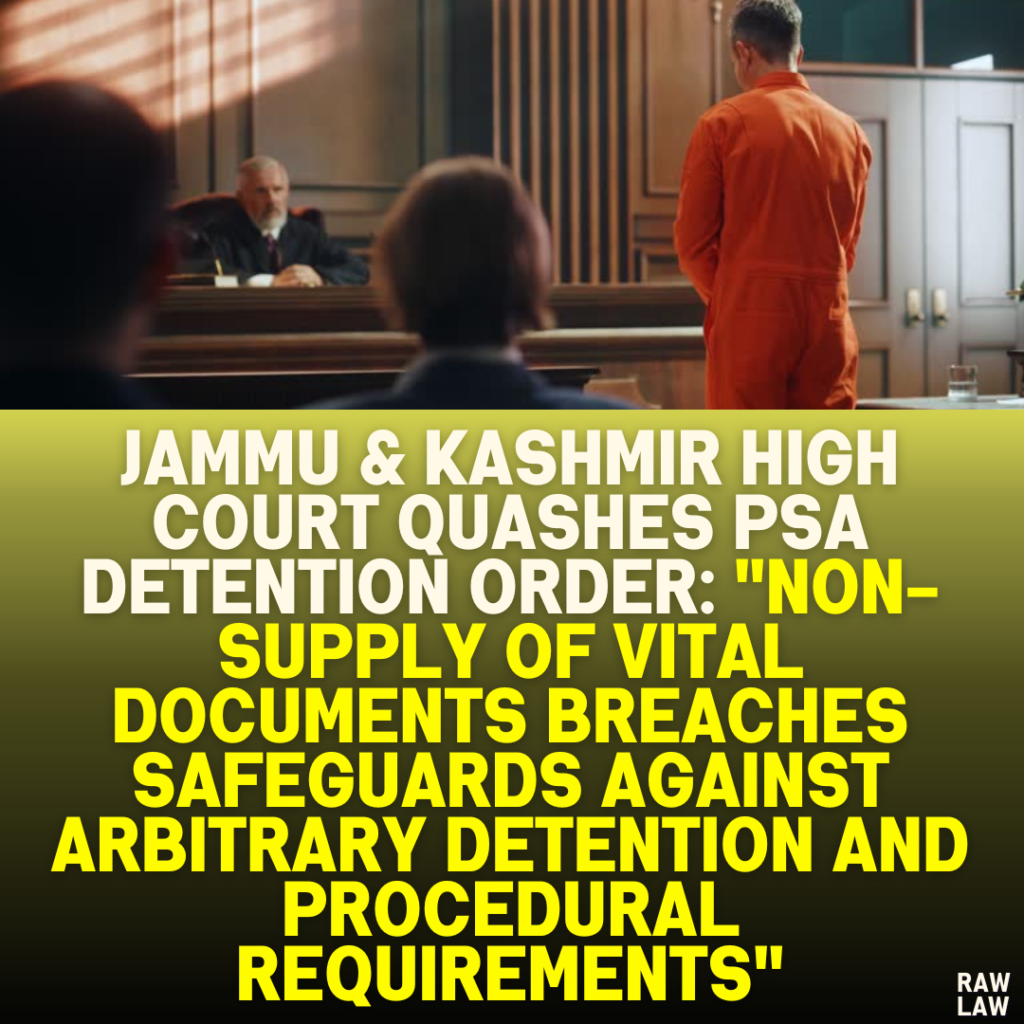1. Court’s Decision
The Jammu & Kashmir High Court quashed the detention order issued under the Public Safety Act (PSA) by the District Magistrate, Shopian, against the petitioner. The court observed that the failure to supply essential documents to the detenue, which formed the basis of the detention, violated procedural safeguards. This breach of constitutional and statutory requirements rendered the detention order unsustainable in law. The court directed the immediate release of the detenue unless he was required in connection with another case.
The court stated:
“Vital safeguards against arbitrary use of law of preventive detention have been observed in breach by the respondents in this case, rendering the impugned order of detention unsustainable in law.”
2. Facts
The petitioner challenged the preventive detention order dated 17.07.2023 issued by the District Magistrate, Shopian, under the PSA. This order alleged that the petitioner was involved in activities prejudicial to the security of the Union Territory (UT) and placed him in preventive custody to prevent such activities.
Key contentions by the petitioner included:
- The detention order was issued mechanically, without application of mind.
- The allegations in the grounds of detention lacked factual basis and were fabricated by the police.
- Procedural safeguards under the PSA were not followed, as essential documents supporting the detention order were not supplied to the detenue.
The respondents defended the detention, asserting that:
- The petitioner’s activities posed a significant threat to state security.
- All procedural and constitutional requirements were fulfilled.
- The detenue was provided with the grounds of detention and informed of his right to representation.
3. Issues
The court addressed the following key issues:
- Did the detention order violate procedural safeguards, particularly the non-supply of essential documents?
- Were the allegations in the grounds of detention sufficiently specific and supported by evidence to justify preventive detention?
4. Petitioner’s Arguments
- Mechanical Issuance: The detention order was issued without application of mind and was based on vague, baseless, and fabricated allegations.
- Procedural Violations:
- The petitioner was not supplied with the PSA warrant, notice of detention, or the detention dossier.
- This non-supply prevented him from making an effective representation before the Advisory Board, as required under the PSA.
- No Nexus Between Grounds and Detention: The allegations were unsubstantiated and lacked a connection to the petitioner’s actions.
The petitioner emphasized that procedural lapses invalidated the detention order, as they infringed fundamental rights guaranteed under Articles 21 and 22 of the Constitution.
5. Respondent’s Arguments
- State Security Threat: The petitioner’s activities were highly prejudicial to the security of the UT, warranting preventive detention.
- Compliance with Law:
- All procedural requirements under the PSA were followed.
- The petitioner was informed of his right to make a representation against the detention.
- Provision of Documents: The grounds of detention were supplied, and their contents were read and explained to the petitioner.
6. Analysis of the Law
The court delved into the procedural safeguards required under the PSA and the Constitution, emphasizing that preventive detention laws must be strictly construed to prevent misuse.
- Requirement of Material Supply:
Section 13 of the PSA mandates that all materials forming the basis of a detention order must be supplied to the detenue. This enables the detenue to make an informed and effective representation before the Advisory Board. - Non-Compliance:
The court found that essential documents, including the PSA warrant, notice of detention, and detention dossier, were not provided to the detenue. The grounds of detention alone were insufficient to fulfill procedural requirements.
The court observed:
“The petitioner has been hampered by non-supply of these vital documents in making an effective representation before the Advisory Board.”
7. Precedent Analysis
The court referenced established jurisprudence on preventive detention, affirming that:
- Procedural safeguards are fundamental to ensure that detention orders are not arbitrary.
- Non-supply of essential documents breaches these safeguards, invalidating the detention order.
The court upheld the principle that procedural lapses in preventive detention cases undermine the detenue’s constitutional right to liberty.
8. Court’s Reasoning
The court analyzed the detention record and found that the respondents’ claim of compliance was inconsistent with the evidence.
- The petitioner acknowledged receiving only the grounds of detention (three pages), not the entire material relied upon by the detaining authority.
- The absence of critical documents prevented the petitioner from effectively contesting the detention.
The court concluded that the detention order violated procedural safeguards under the PSA and the Constitution.
9. Conclusion
The court quashed the detention order, holding it procedurally invalid. The petitioner was ordered to be released immediately, provided he was not required in connection with any other case.
The court’s ruling reaffirmed that procedural safeguards must be strictly adhered to in preventive detention cases to prevent arbitrary deprivation of liberty.
10. Implications
This judgment reinforces the principle that preventive detention laws must be implemented with the utmost caution and adherence to procedural safeguards.
- It ensures accountability for detaining authorities, requiring them to strictly comply with legal requirements.
- It strengthens constitutional protections against arbitrary detention, safeguarding individual liberty.
- The decision serves as a reminder that failure to adhere to procedural safeguards renders detention orders legally untenable.
By upholding these principles, the judgment underscores the judiciary’s role in preserving fundamental rights while balancing state security concerns.




Pingback: Delhi High Court Upholds Eviction of Son and Daughter-in-law from Senior Citizen's Property, Asserting Primacy of Senior Citizens Act Over DV Act in Absence of Domestic Violence Allegations - Raw Law